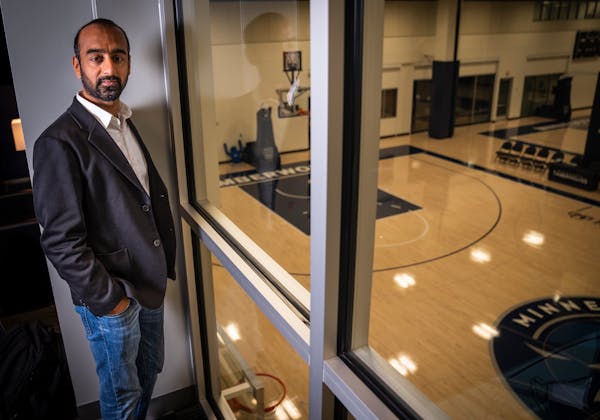As he was about to enter the offseason last May, Timberwolves coach Chris Finch said one of the biggest things he had to figure out over the summer was how best to utilize Karl-Anthony Towns in pick-and-roll coverage.
Before making those stylistic changes, Finch had to see what the roster was going to look like around Towns before landing on how the Wolves were going to operate, and how they would improve on their 28th-rated defense from a season ago.
Former President Gersson Rosas didn't do too much to bulk up the power forward position but he did bring in Patrick Beverley, who has long been one of the best defensive players in the NBA. The Wolves also re-signed Jarred Vanderbilt to add to Josh Okogie and Jaden McDaniels. Those four are likely the best individual defenders the Wolves have.
But the defense often starts up top when another team runs a pick and roll, and often they like to get Towns involved in that action. This season, look for Towns to play in drop coverage less and contend more on screens, or play "at the level," and the Wolves will rely on their athleticism and ability to rotate to compensate what ground Towns may be ceding near the rim.
But as Finch has said, regardless of what kind of coverages the Wolves play, knowing them well and playing on a string can make almost anything work.
"It's more about having a structure, knowing your routes, being able to work your way out of situations. That's what we're trying to do," Finch said. "We're going to have the ability to play several different coverages, but we also want to be more impactful on the ball, which we know is going to put us into some scramble situations."
The "low man" on defense, or the person nearest the hoop on the weak side, will be trying to help at the rim as the defense scrambles to cover everywhere else if a defensive sequence doesn't go well for the Wolves. By having Towns play "at the level" they are attempting to disrupt the flow of the offense and its abilities to move the ball and penetrate.
Towns is fine with this type of coverage and said he is comfortable trying to defend screens in a more involved way.
"It puts a lot of emphasis on the low man," Towns said. "We haven't had much of a low-man concept since I've been here. This is something that's refreshing for me, but also different. It's something I did in college and it worked really well. ... I love the high man. See how it goes, we got to prove it still."
Finch installed a system last season where the Wolves just tried to run around and use their athleticism to compensate for coverage issues. There wasn't much of a difference in results. They had the 25th-rated defense in defensive efficiency before the All-Star break, and the 28th after it. Finch's goal is to at least get the Wolves to be middle of the pack defensively because recent years have shown teams can contend with elite offense and average defense. He also said the Wolves have a few different coverage packages to help accomplish this.
"We'll have two coverages and a switching package, and that's basically going to be it," Finch said. "But you have to be careful they don't all end up looking the same. Then there's no differentiation between what you're doing out there and everything feels the same."
Finch has liked the progress Anthony Edwards made on the defensive end, while teammates have raved about Beverley's intensity on that end of the floor and how he has affected the team's attitude toward defense. Given the tactical adjustments, the dead weight on defense is going to show this season since it relies so much on coordinated movement.
"I feel like with our defense right now, it's really going to isolate who's not playing defense with the way we scramble," Vanderbilt said. "So the guy who is not making that extra effort to run to the corner ... is going to stick out. I think early in training camp, guys caught onto that."
Vanderbilt said the team has been calling each other out in those circumstances, like if someone didn't fulfill their responsibilities as the low man. That's different from last year when a missed assignment would just be the "elephant" in the room and teammates wouldn't say anything.
"If somebody wasn't there on the low man one day, then the next day, they're there, because somebody called him out," Vanderbilt said. "Guys don't like being called out, so if it happens one day, you're going to make sure you're in that spot the next day."
The key for the Wolves will be making sure they're in the right spot the next day, and many days to come after that.

Wild's victory over Montreal comes at a cost: Injuries to two key players

Minnetonka rolls past Anoka and into the Class 6A football Prep Bowl

How will Vikings' Bynum top his latest viral celebration?

Nebraska sinks Gophers in Big Ten volleyball match

